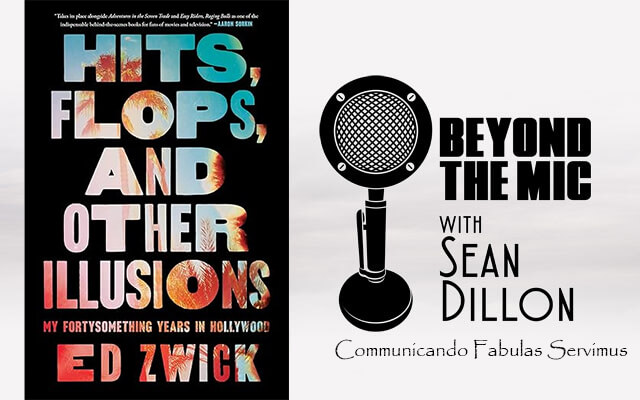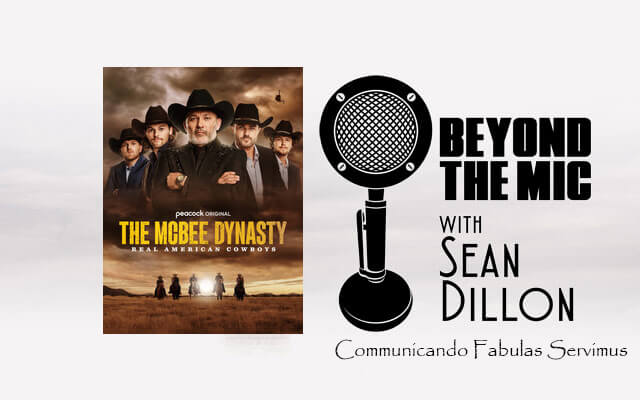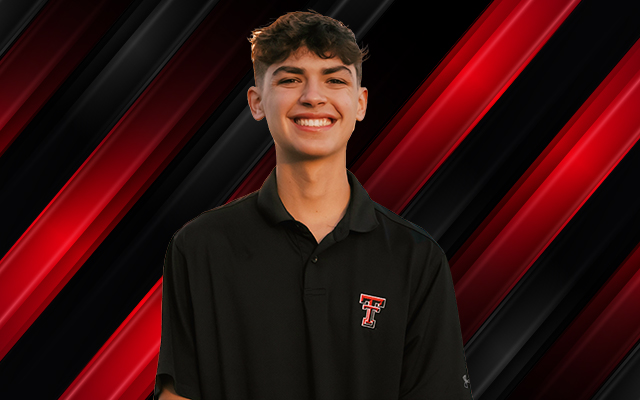Philip Mudd goes Beyond the Mic

When he was young he wanted to play baseball, needs to vacation in the mountains of North Carolina and wants people to know about the tough decisions made by the CIA. Author of the book Black Site : The CIA in the Post 9/11 World Philip Mudd goes Beyond the Mic with Sean Dillon.
I’ve had great interview opportunities over my 25+ year radio history that never made it to air. Some were due to length others were because of topic.
I decided to flip the table on the rules. Any topic / guest is welcome, but you need to tell a story & must go “Beyond the Mic.”
It’s another episode of Beyond the Mic with Sean Dillon.
Author Philip Mudd goes Beyond the Mic
Ann Dewig: Beyond the Mic with Sean Dillon.
Sean Dillon: We’re joined on the Beyond on the Mic Starline by Philip Mudd, author of the book Black Site: The CIA and the Post 9/11 World. Philip, welcome.
Philip Mudd: Thanks for having me on.
Sean Dillon: Let’s go Beyond the Mic. Did you always want to be a CIA officer growing up?
Philip Mudd: No. First, I wanted to be a baseball player, but I was horrible. I sat on a bench in high school and then I wanted to be a teacher. So I got a master’s degree in literature and that didn’t work. So like everybody who can’t get a job, I went to the federal government and they gave me a job in 1985.
Sean Dillon: What made the CIA and the FBI such an intriguing opportunity?
Philip Mudd: I think there are a couple of things. First. You know, the work intrinsically is interesting, whether you’re doing what I did, which is counterterrorism or a lot of my college colleagues were working back down on the Soviet Union or working on China, working on issues like international drug trafficking. Those jobs are pretty compelling. But also, I got to say that the federal government I think this is still true where I was at the bureau and CIA recruits just great people. So the peers I was there with when I was 25, 30, 35 years old, they were really talented and interesting. And I made a lot of fun.
Sean Dillon: When you joined the agency in ’85, you were an analyst for South Asia and the Middle East. What made that so fascinating for you?
Philip Mudd: There are a couple of things. First, just learning the intelligence business. You know, the first time I remember reading intercepted communications like this is too cool. I didn’t realize I’d get to do this. I was pretty naive going in, I guess. And then we’re looking at intractable, intractable problems like the dispute between India and Pakistan. And going on through the 90s and starting in the early 90s, I started to look at the phenomenon of terrorism. It was sort of a backwater at the agency then. But in the mid 90s, this guy named Osama bin Laden appeared on the scene and we didn’t know a lot about him. But actually, it especially given the tragedy of 9/11, it was in retrospect pretty interesting,
Sean Dillon: Where were you on 9/11?
Philip Mudd: I was at the executive office building, the White House, which is sort of that annex to the White House. It looks like a wedding cake. Right. And right next to the West Wing. So I remember the second plane going and we were evacuated. Boy, none of us knew what was going on. I was on the streets of Washington, D.C., right outside the White House. And it was like a Hollywood movie set. It was just chaos. People thought that there was an attack on the State Department. It was just just chaos. I’ll never forget that day.
Sean Dillon: How do you feel about the lack of intelligence, the full intelligence about al-Qaeda? How that affected the CIA at that time?
Philip Mudd: I think a lot of people, myself included, look back with sadness and frustration. I mean, there’s only so much you can do when an organization takes over essentially part of a country and you don’t conduct raids because those are so risky. You’re putting off servicemen and women at risk. You don’t conduct operations to kill for terrorist leadership before 9/11 because that’s seen this is too risky. And then you look back over time and say, boy, I wonder if the government and the American people had been more willing to take risks. And I’m not being critical. I’m just looking back with kind of pain, I guess. I wonder if history would have been different. I don’t think so. I think it took a global coalition of countries, you know, a decade to really put a huge dent into al-Qaida. And I’m not sure how you would do that without the tragedy of 9/11.
Sean Dillon: As you wrote this book, you try to get the reader to understand the position, the hard position the CIA was in after 9/11. You examined the difficulty of facing an opponent we’ve never faced before.
Philip Mudd: Yeah, that’s sort of why I wanted to get into the top two, maybe three dozen of my peers who would not talk to the media. They didn’t want to write books. I wanted not only to tell the story of the CIA detention program, which had never been told in this way before. But to give readers a sense of what the world looked like through the lens of my peers, a lot of whom were were friends. So they they were pretty open with me. I think people forget that back in 0 1 0 2 or 3, we didn’t know that much about al-Qaida. And I actually thought we were losing. I thought they had the upper hand in it. I wasn’t sure that we would be able to turn the tide back in about 0 4 or 5. I started to think we’re winning, but the early days we didn’t know much. I thought we were in a lot of trouble.
Sean Dillon: How frustrating was it to be in a situation of not having the information when the Central Intelligence Agency is all about information?
Philip Mudd: I think it was frustrating, but more than that, it was it was saddening. I remember driving home every night and back to the newspapers in those early weeks and months after 9/11. We’re doing features of stories with photographs and faces of the fallen and families that had lost parents typically or in some cases, parents who had lost children. I talked to one mother who had the last recording of her son calling from one of the towers where she never came home. It’s the sense that there was there was an organization that thought that the murder of almost 3000 innocents was was not only acceptable, but when we started capturing al-Qaida detainees, they were quite proud of this, just more than frustration, a sense of sadness that this is what we had to deal with today. In that sense, also a sense of. If you had to do it, there was no option.
Sean Dillon: What pressure did you feel as deputy director of the CIA Counterterrorist Center and FBI National Security Branch?
Philip Mudd: I don’t think that’s the word I would use. You know, when you look at plots breaking every day, plots within al-Qaida, plots in American cities, going back to the early days of the post 9/11. You sit there and say, you know, eventually some of these are going to score. You can’t play it. You can’t have dozens or hundreds of plots over the course of years and not have some people, some form plotters get through the American net. So I think more the sense of an inevitability and a wonder of the big question I had and I think my peers had this as well. Something they talked about for the book was the sense of whether there would be another second big one. And a second 9/11 that might include anthrax. That concern about a second wave, not a small attack, but another catastrophic attack was really the thing that that worried a lot of people like me. Not something small, but something else where the American people would say, I can’t believe you let this happen again.
Sean Dillon: We’re joined Beyond the Mic by the author of the book Black Site: The CIA and the Post 9/11 World. Philip Mudd, in your book, you write, quote, At that time before the attacks, there was no consideration of any enhanced interrogations. None, unquote. Are the CIA and FBI now in a position where they’ve learned from rushing into creation of this program? Or does the fear of preventing another attack such as 9/11 continue to weigh on them?
Philip Mudd: I think both. I mean, if you’re sitting in the kind of chairs and you got to be concerned every day that you’re gonna miss one. But the sense and I hear this, the American public a once in a while less often than I used to, the sense that maybe the CIA or the U.S. government or the president would authorize a program like the program I laid out in the book, the interrogation program. I can’t imagine that ever happening my lifetime. It’s not because people in my generation regret what happened. That is the interrogation program. It’s good because people learn that that the Congress, the American people didn’t have stomach for this for law. And the speed with which the Congress and others backtracked on on the support for the interrogation program in 2002 and beyond was surprising. So I think my peer generation would say what the American people want or that we’re not doing that again, not going to happen.
Sean Dillon: How do the fears of the black sites going public changed the way the CIA operated?
Philip Mudd: Well, there are some tactical issues back when the black sites were being created. One was, you know, how. How do you have backup sites so that if the site gets blown, you can you can move prisoners someplace. But there was a bigger question that that people called and I outlined in how I wrote the interviews I did that people called end game very early on. You’re talking as soon as 0, 2 or 3. A lot of the managers of the secret prisoners we had said we can’t keep these guys forever. We’re here to interrogate them and learn about what intelligence they have. But we’re not jailers. And so this sense that this information about black sites was going to become public, that you couldn’t keep the location secret forever, drove conversations at CIA and the White House for people to say, what the heck are we going to do with these prisoners? That was finally resolved near the end of the George Bush administration when he said not only do we have prisoners, but we’re transferring them to Guantanamo. And that’s where some of them still live.
Sean Dillon: You write in your book, Black Site, from one of the officers witnessing the enhanced interrogations. Quote, You would just think that we would sit down afterwards as a group to talk about the interrogation. But we all went our separate ways on the facility afterwards. Unquote. Would you say those fateful decisions ever haunted those who gave the orders?
Philip Mudd: I would not say haunted. I talked to my colleagues about that when I when I did all the interviews. And I think the question was what’s what better option do we have? It’s like you get a pair of deuces and somebody says you’re playing against somebody with a full house. What are you going to do? I think there was a sense of the seriousness of what was going on. And that’s why the CIA spent so much time documents and what was happening legally to ensure people understood they were complying with the law. But in terms of haunting, I’d say no. Just because people anticipated the second wave of attacks, as I mentioned, I think the second wave of attacks would have happened if America had not responded so aggressively, including the military and intelligence intervention in Afghanistan. People look back and say that if we hadn’t been so aggressive, maybe al-Qaida would have succeeded and nobody would be talking about this anymore. They’d be saying, how could you let that happen?
Sean Dillon: How does the lessons learned and or the mistakes made during the creation of the black sites helped or hurt the CIA as it exists today?
Philip Mudd: I think in terms of the program, the interrogation program itself, it matured pretty quickly over time. The initial stages, as as I talked about, were pretty rough because this was a business the CIA never been involved in. They went in quickly and made mistakes. Lawyers, specialists, got involved in over time crafting policies, procedures. Know how the black site facilities were actually managed in terms of today? I’m not sure I’d say it. It hurts to see. I think my peer generation would be clear not only in saying we’re not going to do that again because the judgments people had about it afterwards in the rearview mirror, but also when you get involved into a program of this sensitivity. We didn’t document as much as we should, especially interactions with the Congress. I think people of my generation would say anytime you get involved with the Congress in the White House, write down every word they say, because sometime down the road, if things get ugly, they’re going to say, we didn’t really know it. It’s not a great perspective, but it’s what I remember getting burned by the Congress and saying ain’t never going to let that happen again.
Sean Dillon: Black Site: the CIA in the post 9/11 world is the book, Philip Mudd is the author and he joins us Beyond the Mic. You wrote, quote, The CIA prides itself on ingenuity, agility and general will and capability to turn on a dime to accomplish a mission, unquote. Has a reflections of the creation of the black sites changed the way you perceive the CIA?
Philip Mudd: Not really. I mean, the CIA has big upside in what I learned from the FBI, ways of operating that are that cause some problems. The upside and I think that still exists, although I’m guessing that it’s different than it was 17 years ago. The upside is agility. People will say, look, what do you want us to do? We’ll do what we’re supposed to do stuff secret. We supposed to do stuff that other agencies don’t want to do, and we do it fast. The downside of that is in terms of especially in contrast to the FBI, where I spent years. The downside is people are moved so quickly, policies and procedures aren’t always as airtight as they might be. There’s a lot of risk in running spy operations overseas. So eventually they’re going to blow up in your face. A lot of them. Well, a lot of what we did ended up on the front page of newspapers. But I think that agility, aggressiveness is something the CIA is rightfully proud of. I know some of the people who are still there. I suspect they’re still proud of being that way.
Sean Dillon: Well, time’s running out, so it’s time for the Rockin’ 8 first thing that comes to your mind. No pressure.
Sean Dillon: Hobby you do when you’re not working.
Philip Mudd: Cooking.
Sean Dillon: Place in the world you like to visit on Vacation.
Philip Mudd: Mountains in North Carolina.
Sean Dillon: Last book that you read?
Philip Mudd: The Patriarch by David Nasaw
Sean Dillon: What was the last Villanova sporting event you went to.
Philip Mudd: Villanova basketball. Big five.
Sean Dillon: Last board game you played.
Philip Mudd: Well, man. Dominoes.
Sean Dillon: Music you like to listen to when you’re writing.
Philip Mudd: Classical or jazz.
Sean Dillon: If you could change one mistake or change one thing from your life, what would it be?
Philip Mudd: Being more polite when I was younger.
Sean Dillon: If you could reassure the citizens of the USA about one thing, what would it be?
Philip Mudd: You’re safer than you think if you worry about terrorism.
Sean Dillon: When he was young, he wanted to be a baseball player, wants to vacation in the mountains of North Carolina and just wants people to know some of the tough decisions made every day at the CIA it’s author, Philip Mudd, thank you so much for joining us today.
Philip Mudd: Thanks for having me. And making me think I appreciate that
Sean Dillon: That my friends, is Beyond the Mic.



